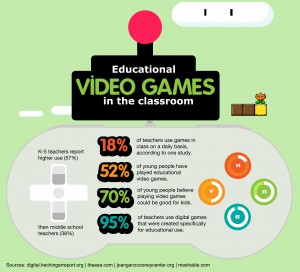 By engaging students and pushing them to succeed, games may offers a new way to teach students, according to an expert on performance and gaming.
By engaging students and pushing them to succeed, games may offers a new way to teach students, according to an expert on performance and gaming.
In a presentation at least week’s “Educause” conference in California, Jane McGonigal – a game designer, author and researcher – predicted that “extreme learning environments” will offer students a chance to play and create while they learn.
“We normally think of games as being fun, kind of trivial, maybe something to pass the time, but what if we thought about them as a platform for inventing the future of higher education?” McGonigal said in her presentation, according to Ed Tech magazine.
Educause is a nonprofit group that bills itself as the foremost community for information technology professionals who are interested in advancing higher education. The association’s annual conference was held this month in Anaheim, Calif.
McGonigal is a proponent of using games to better education. She is the author of “Reality is Broken: Why Games Make Us Better and How They Change the World” and former director of Games Research and Development at the Institute for the Future in California.
According to her website, McGonigal believes that gaming “can make a better world.” At the 2012 Ted Global talk, she argued that games can increase resilience, help with experiencing post-traumatic growth and “even give us 10 extra years of life.”
During her talk at Educause, she offered statistics to bolster her argument that gaming has high potential in education because it engages the user. Some of the statistics, according to Ed Tech, included: 1 billion people spend at least an hour a day playing a game; a Gallup survey in 2012 revealed 71% of workers are not engaged and the lack of worker engagement costs businesses $300 billion annually in lost productivity.
Also, according to numbers from McGonigal, children become less engaged the longer they stay in school – 76% are engaged in elementary school, 61% in middle school and only 44% in high school.
McGonigal, who has a PhD in performance studies from the University of California –Berkeley, said gaming can help with this lack of engagement. She noted that gaming activates bring out the sort of emotions – creativity, contentment, excitement and curiosity, for example – that can lead to people being more engaged.
These feelings also help people overcome depression, a benefit that can last long after the game is finished, according to McGonigal. “Thanks to advances in neuroscience, we can see that game play is literally the opposite of depression,” she said, according to Ed Tech. “Gamers fail, but you have this positive emotional resilience. Think about how different that is from our current educational system.”
McGonigal offered three new games she thinks are leading the way for using gaming in education.
“Foldit,” at the University of Washington, offers gamers a chance to contribute to scientific research through a game that involves virtual protein folding. The resiliency of gamers – they don’t give up easily – makes them more adept at solving complex problems involving protein structure. Some of the gamers have already been cited in scientific journals, according to McGonigal.
“Urgent Evoke,” developed by The World Bank, Is used to teach sub-Sahara African youths ways to solve social problems in a way that also fosters environmental sustainability. The players level up by accomplishing tasks such as securing a community’s food supply or finding a sustainable power source.
Another example is a game designed by McGonigal – “Find the Future” – involves online collaboration and virtual clues that lead to gamers to finding a pathway for their own future during one night at the New York Public Library. The game allows them to become familiar with some of the great writings from some of the greatest minds in history.
They eventually work together to write and publish a personal essay on what they have learned.





